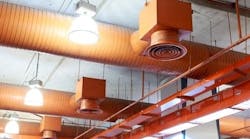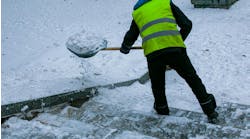The benefits of providing good, clean air in your facility pays dividends. Building occupants feel more refreshed, healthier and productive. Air filtration systems contribute to good IAQ and improve HVAC performance, but when they’re improperly maintained, they can cause more problems than they solve.
Related: 4 HVAC Tips to Improve IAQ
Is your air filtration system contributing to IAQ issues?
Issues with Faulty Air Filtration
Improper installation and maintenance are the two most common mistakes that neutralize the usefulness of air filtration systems. An improperly cared for air filtration system can do more harm than good in some instances.
Use Plants to Improve IAQ
Want to supplement your air filtration system? Some plants can eliminate unhealthy substances in the air. Find out what plants are most effective.
“HVAC systems can even act as sources of pollutants in some cases, such as when ventilation air filters become contaminated with dirt and/or moisture and when microbial growth results from stagnant water in drip pans from uncontrolled moisture inside of air ducts,” states the EPA. “Properly installed and maintained filters can trap many of the particles in this outdoor supply air.”
Don’t overlook possible problem areas for your air filtration system after installing new HVAC equipment, as mistakes or sloppy implementation can have consequences.
Is Your HVAC System Spreading Thirdhand Smoke?
“An understanding of the entire HVAC system is helpful to ensure that the air filters are properly installed,” notes the National Air Filtration Association (NAFA). “When changing model or design, consult manufacturer’s instructions. Maintaining the system’s integrity is vital to proper air filtration.”
Making sure you have a properly sealed system is key to preventing bypass and maintaining system pressure, explains NAFA. After installation, check the system (e.g. filter frames, fastening devices, gaskets, etc.) so there are no leaks and gaps. These issues can undo newly installed HVAC equipment responsible for improving IAQ.
However, if your facility contends with gaseous or chemical pollutants on a more regular basis, you may need more specialized filtration equipment, notes the EPA.
Air Purifier vs. Air Filtration
Commonly conflated, air purifiers and air filtrations systems are slightly different. While both clean the air you breathe, they typically have different roles in terms of improving IAQ.
Air filters make HVAC units more efficient and improve IAQ by catching pollutants in a mesh-like material so they don’t move throughout the building. The highest quality filters also capture bacteria and other microbes. HEPA filters pull at least 99.97% of particles from the air and work well.
Air purifiers are designed to kill bacteria and other microbes, typically by using UV lamps that destroy the microorganisms.
Preventive Maintenance
Proper air filtration in your facility requires you to be proactive with maintenance. Establishing a preventive maintenance program is vital to ensure your system is taking contaminants out of the air.
NAFA suggests the following actions to keep your air filters from failing:
- Inspect filter frames, fastening devices, gaskets and duct work
- Remove and replace damaged or defective gasketing and duct insulation to keep air from bypassing the filter
- Keep coils and blower free from dirt and debris by regular cleaning to improve airflow, increase system efficiency and maintain overall integrity
“In summary, good housekeeping will keep the HVAC system in proper working order and will provide the facility with air that is not only heated and cooled, but also cleaned with a reduction in contaminant levels,” notes NAFA.
Read next: 4 Biggest Building Maintenance Challenges and Solutions
Justin Feit was associate editor of BUILDINGS.


